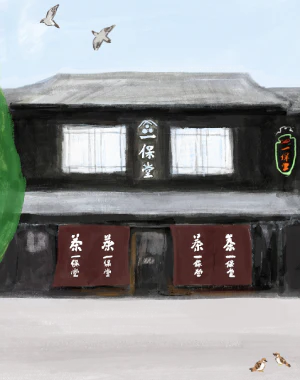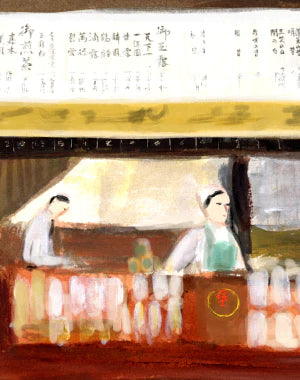About Tea
Where our tea is grown
Tea fields on steep hillside slopes require a lot of manual labor, including continuous daily care as well as hard work during picking season. The production of high quality tea relies on the devoted efforts and passion of experienced tea growers.

The flavor of Ippodo tea
Ippodo offers about thirty brands in four tea categories—matcha, gyokuro, sencha, and bancha. Each of our in-house blends is made by procuring different kinds of carefully selected high quality tea leaves and blending them to achieve the taste and fragrance of that brand. Our key job is to maintain the flavor of Ippodo tea by leveraging our keen eye for selecting tea leaves that live up to the standards of Ippodo tea flavor and using our blending techniques to produce each brand by mixing different kinds of tea leaves. Ippodo delivers brands with consistent taste by producing blends based on each brand’s flavor, rather than on the season or the tea field. So, when you find your favorite brand at Ippodo, you can come back to the taste and fragrance that pleases you whenever you like and continue to enjoy it for many years to come, and even pass it down to your children and grandchildren.
Producing the right taste
Matcha, gyokuro, sencha, and bancha each have very distinctive tastes. Ippodo provides a range of brands for each category of tea, blending each to have the appropriate strength of taste and fragrance. Within each category of tea, the higher the price, the greater the refined richness, and the lower the price, the lighter the taste. Savor and explore the flavors of refined, rich teas, or enjoy lighter teas that are suitable for many different situations with meals and sweets. There are Ippodo teas appropriate for virtually any occasion.
Fostering delicious flavor by leveraging the magical effect of time
Tea leaves cultivated in the mountains enveloped in river mist have well-developed mesophyll—the inner tissue of the leaf—and wonderful fragrance. We begin the manufacturing process quickly, before the tea leaves lose their delicious natural flavors. The taste of freshly picked tea leaves in May is still very green, immature, and a bit sharp. Ippodo’s approach is to retain the vigor of this taste and fragrance, but mature the leaves to produce a smoother tea. Our wish is for customers to be able to fully appreciate the rich, delicious taste of freshly made tea using tea leaves that have flavor with depth and complexity that has been nurtured over time.
The power of tea leaves and the relationship between water temperature and taste
When you prepare Japanese tea in a kyusu, pouring hot water over fresh tea leaves, letting it brew, and then serving it into teacups, that’s just the first pot. What some people don’t realize is that you can repeat the cycle, and reuse the same tea leaves to prepare more pots. The first pot is replete with sweetness, umami and fragrance. The second is milder. The third is very light. The fact that you can prepare multiple pots by reusing the same tea leaves reflects the power that Japanese tea possesses.
You can also produce different tastes with the same brand of tea, in addition to its standard taste, by adjusting the water temperature used during brewing. Raising the water temperature produces a lighter taste, while a lower water temperature gives the tea a smoother, more well-rounded flavor. Each tea brand is created using a blend of different kinds of tea leaves, so adjusting the water temperature allows you to bring out and savor different aspects of the tea’s character. Use this knowledge to fully appreciate the power that resides in Ippodo tea.
























